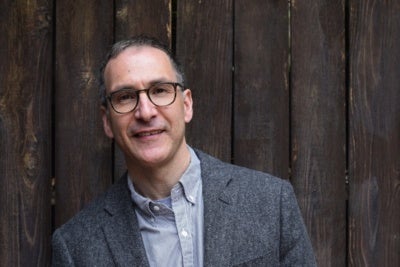The End of Loyalty: A Book Talk with Rick Wartzman
Missed the discussion? Watch the recording below.
About this Event
In post-WWII America, workers had a different relationship with their employers than workers do today. Many workers stayed with one company for the long haul, earning solid wages, good benefits, and pensions in exchange for loyalty and hard work. That social contract spurred the creation of the largest, strongest middle class in history. But much has changed in recent decades.
In his richly detailed and eye-opening book, Rick Wartzman chronicles the erosion of the relationship between American companies and their workers. Wartzman tells the stories of four major employers — General Motors, General Electric, Kodak, and Coca-Cola. By tracing the ups and downs of these four corporate icons over seventy years, Wartzman illustrates just how much has been lost: job security and steadily rising pay, guaranteed pensions, robust health benefits, and much more. Charting the Golden Age of the ’50s and ’60s; the turbulent years of the ’70s and ’80s; and the growth of downsizing, outsourcing, and instability in the modern era, Wartzman’s narrative is a biography of the American Dream gone sideways.
The Economic Opportunities Program and the Financial Security Program hosted Rick Wartzman to discuss his new book “The End of Loyalty: The Rise and Fall of Good Jobs in America” in a discussion with Neil Irwin, senior economics correspondent for The New York Times on Monday, September 25.
The Author

Rick Wartzman, @RWartzman
Rick Wartzman is director of the KH Moon Center for a Functioning Society at the Drucker Institute, a part of Claremont Graduate University. He also writes about the world of work for Fortune magazine online. Before joining the Drucker Institute in 2007 as its founding executive director, Rick worked for two decades as a reporter, editor, and columnist at The Wall Street Journal and Los Angeles Times. While business editor of The Times, he helped shape a three-part series on Wal-Mart’s impact on the economy and society, which won the 2004 Pulitzer Prize for National Reporting.
The Moderator

Neil Irwin, @Neil_Irwin
Neil Irwin is a senior economics correspondent for The New York Times, where he writes for The Upshot, a Times site for analysis of politics, economics and more. He is the author of “The Alchemists: Three Central Bankers and a World on Fire,” about the efforts of the world’s central banks to combat the global financial crisis, published by the Penguin Press in 2013. Neil was previously a columnist at The Washington Post and an economics editor of its Wonkblog site. As a beat reporter covering economics and the Federal Reserve, he led the Post’s coverage of the financial crisis and the government’s response to it.
Twitter Highlights
.@conway_maureen kicks off our #WorkandWealth book talk with @RWartzman and @Neil_Irwin. pic.twitter.com/1V0E2W8FDn
— Aspen FSP (@Aspen_FSP) September 25, 2017
In “golden age” biz offered workers* job security, decent pay, healthcare &retirement benefits (*mainly white men) @RWartzman #WorkandWealth pic.twitter.com/oBf9VscrTe
— Maureen Conway (@conway_maureen) September 25, 2017
.@RWartzman talking about shift frm stakeholder to shareholder value, w/ profound implications for #workandwealth @Aspen_FSP @AspenWorkforce pic.twitter.com/SUqQknBTdb
— Ida Rademacher (@idarademacher) September 25, 2017
During strongest middle class, CEOs valued “balancing interests of all stakeholders & most importantly workers.” – @RWartzman #WorkandWealth
— National Fund (@National_Fund) September 25, 2017
.@RWartzman: Missteps by unions & a push by companies to stamp down workers organizing led to the decline of labor unions #workandwealth
— Aspen FSP (@Aspen_FSP) September 25, 2017
Some skills gaps BUT for many jobs employers would find the talent they need if they’d pay more, train more #WorkandWealth
— Amy Blair (@amyblair63) September 25, 2017
We need to return to “stakeholder value” by creating new “corporate social compact” @RWartzman #WorkAndWealth pic.twitter.com/D4i3tf5X1O
— Zach Komes (@ZachKomes) September 25, 2017
“Market forces and political forces are deeply intertwined and interact with one another.” @Neil_Irwin #WorkAndWealth
— Zach Komes (@ZachKomes) September 25, 2017
Workers lack wealth that allows for risk-taking behavior- household balance sheets have weakened over decades #workandwealth @idarademacher
— EA Consultants (@BarbaraatEA) September 25, 2017
Watch the video! A discussion about work & @RWartzman‘s book. @Neil_Irwin @AspenInstitute @Aspen_FSP #WorkandWealth https://t.co/uxhIimtZmo
— Roger Panetta (@NimbleAtWork) September 26, 2017